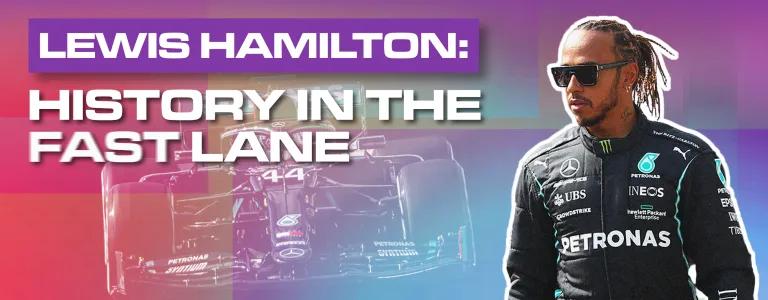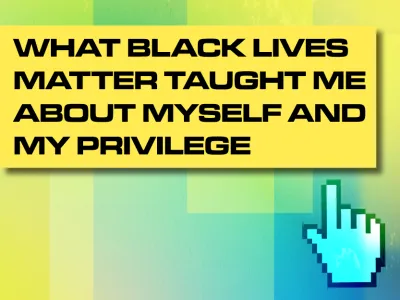
Lewis Hamilton: History In The Fast Lane
Include this article in your Skills Builder Journal. It could help you develop... 

The name Hamilton has been on everyone’s lips since the seemingly inimitable (*wink wink*) success of Lin Manuel Miranda’s rap musical about American revolutionary Alexander Hamilton. But, carving a passage into Formula 1 (F1) history is Lewis Hamilton, an upcoming revolutionary who’s pushing the boundaries of what’s possible both on and off the track.
Lewis is one of the most celebrated drivers in motorsport, driving in the big leagues of F1; he’s arguably the top driver in the top championship in the world. He’s also the only Black person to have competed at this level of racing, making his achievements even more incredible and highlighting the issue of inequality in this industry – an issue he’s taking huge steps to tackle.
My parents have followed Formula 1 religiously for as long as I can remember and they’ve supported Lewis ever since he started, so he’s always been the most prominent sportsperson in my life. Hardly a month goes by that I don’t hear the crazy scream of “Come on, Lewis!” bouncing off our walls when a race gets particularly exciting. I’ve never been a big fan of the sport, but it’s impossible to ignore how talented and hardworking he is. This Black History Month, I want to celebrate his accomplishments and this portion of history that’s happening right before our eyes.
Lewis’ racing career began in 1993 when he started go-karting, though his passion for motorsport had always been there, when at six years old he beat adults in a national remote-controlled car race. Fast forward two years to 1995 and he’s the youngest winner of the British Cadet Karting Championship, giving the world a taster of what was to come. Before he even reached his teenage years, people were betting on when he would win a Formula 1 race and even a championship. When he was thirteen, Ron Dennis (who was the boss of McLaren’s F1 team) offered him a position in the McLaren Young Driver Programme, a contract which also gave Lewis a chance to drive for that team in the future. His karting success continued as he made his way up the ranks and proved he was something special.

At the turn of the millennium Lewis started car racing. Over the next six years, he moved steadily from strength to strength, gaining experience and building an impressive portfolio. He excelled in Formula Renault, Formula 3 (British and European championships) and GP2. In 2007, he was confirmed as the McLaren F1 team’s driver alongside the then-champion Fernando Alonso.
And the rest is history, literally. Over the last decade and a half, he’s become the most successful driver in Formula 1. He holds the record for most Grand Prix wins and for pole positions (in Qualifying, racers compete for a starting position at the front of the grid for the actual race – pole position is the first spot on the grid). But that’s not all…
After each race, the drivers who finish in the top ten get points ranging from one to twenty-five depending on how well they did. There’s also a point available to the person who manages the fastest lap. At the end of the season, the individual with the most points wins the Driver’s Championship, while the team with the most points wins the Constructor’s Championship. Last year, Lewis equalled Michael Schumacher’s record for most Driver’s Championships by winning his seventh, and this year he’s fighting for an eighth.
I think it’s safe to say his ability on the track is breathtaking to fans of motor racing, while his determination to keep pushing forward is remarkable. What’s even more inspirational is how he’s using his platform to make purposeful changes to the sport.

Over the years, Lewis has challenged racial inequalities and the lack of diversity in Formula 1. In 2020, he took the knee before every race as part of the We Race As One initiative to show his support for the Black Lives Matter movement. He has also publicly held other major figures in F1 accountable for their silence on related matters.
To combat some of the barriers Black people face in STEM pathways, he has also created The Hamilton Commission with the Royal Academy of Engineering. It aims to address racial inequality and the underlying causes in motorsport and other engineering sectors and gives young Black people more opportunities. Leading on from this, Lewis also established the charity Mission 44 “to support, champion and empower young people from underrepresented groups in the UK to succeed”.
On top of this, he’s spoken out about human rights infringements, environmental issues and animal rights, proving time and time again he’s not going to let important things go unnoticed.
And this is only scratching the surface. At the start of this year, he became the first active Formula 1 driver to be knighted, adding to his already impressive list of honours. The future is his to make, and it’ll be really exciting to see what heights he reaches next.




